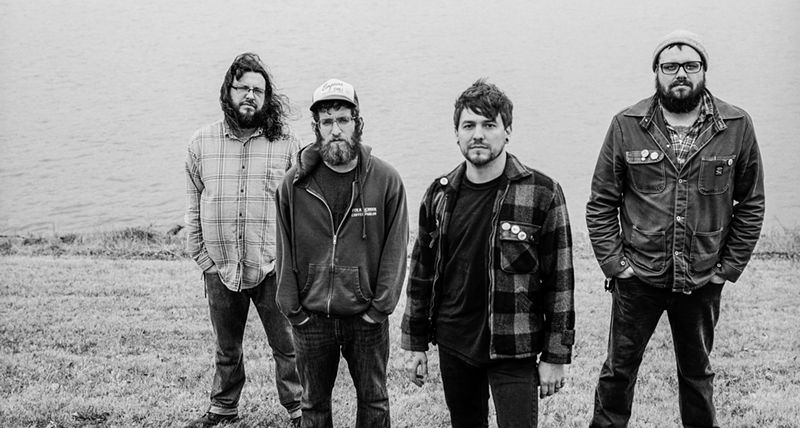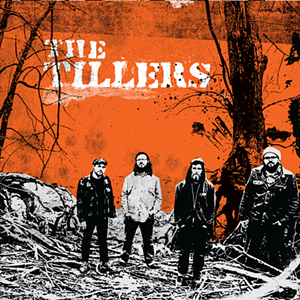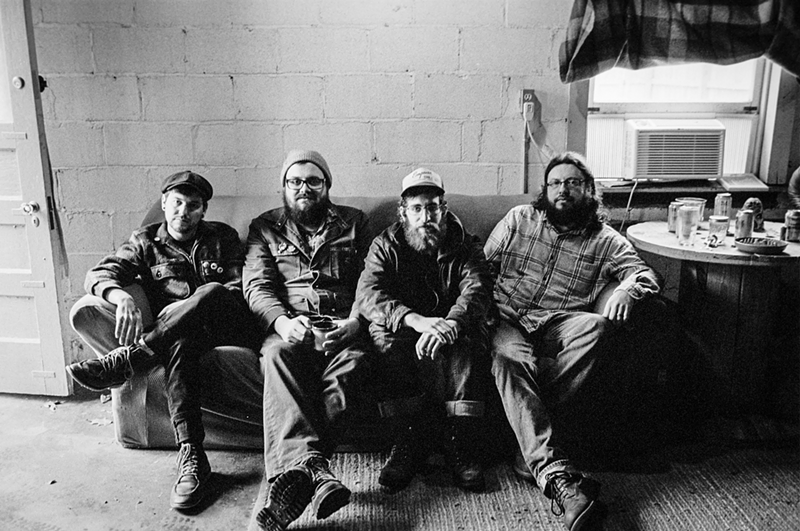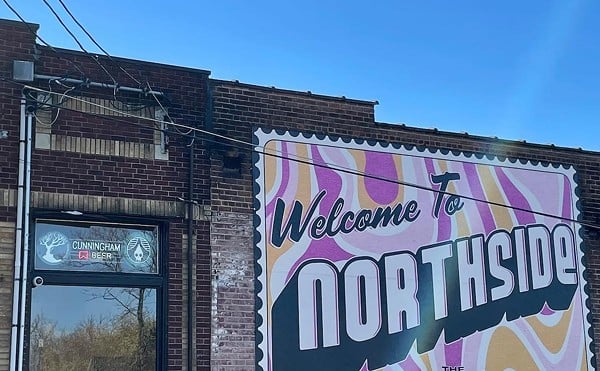Mike Oberst has the bedraggled look and swimming-in-honey reaction time of a new father. He’s already got his hands full with his 3-year-old son Willie, a rambunctious toddler who has taken a recent shine to Bob Marley, a love that Oberst is fueling with repeated exposure to the Reggae legend’s YouTube videos and music. And now with month-old Milo in the mix, The Tillers’ vocalist/guitarist/banjo wrangler radiates the glow of a man in rapturous love with his family, slightly muted by three hours of fitful sleep.
Both of Oberst’s sons arrived during the five-year gap between the Folk/Americana band’s last album, 2013’s acclaimed Hand on the Plow, and their about-to-be-released self-titled new album. As guitarist/vocalist Sean Geil points out, the time between albums represents nearly half of The Tillers’ existence since their 2007 launch, a period that also encompassed Geil’s own journey into fatherhood (his son Auggie was born just before the release of Hand on the Plow).
The additions to The Tillers’ actual families were mirrored in the band itself when the group expanded from a trio to a quartet when Oberst, Geil and his bassist brother Aaron were joined by fiddler Joe Macheret in 2016, which added a new and exciting element to the band’s sound. The elation that greeted all these new beginnings was seriously tempered by the loss of former Tillers bassist Jason Soudrette, who died in 2014 after a battle with leukemia, and the diagnosis of Non-Hodgkin lymphoma received by Geil’s partner Anna Mouch just after the 2013 birth of their son. It was a period of wildly spiking highs and lows, all of which went into the making of the album The Tillers.
“Personally, I feel like we’ve done a lot of growing up since Hand on the Plow came out,” Oberst says over coffee at his Sayler Park home. “It’s been a lot of slogging through negative and hard, sad things that have happened, but also really joyous, life-changing, life-affirming things as well. But we’ve always remained The Tillers. We’ve added to The Tillers, but we’ve also lost a Tiller. Now, this record feels to me like some sort of statement of ‘We’re back,’ but also ‘We never left.’ So it felt like we never even had another name for it. It’s just us and it’s in your face.”
Clearly one of the most important elements that helped shape the sound of the new album was The Tillers’ dedication to touring after the release of Hand on the Plow. Although they curtailed a certain amount of roadwork in the wake of three births, the band has remained an active live entity, locally, regionally and nationally.
“We’ve probably toured more in the last five years than we did in the first five years, although it feels more focused now,” Geil says. “Before, we’d go on tour for two and a half weeks and play six shows. We’d be like, ‘We’re just gonna busk in Austin during the entire South by Southwest.’ ”
“The difference now is that we drive our booking agent crazy, because we make him work harder,” Oberst says. “We need those meat-and-potatoes gigs. Tours have to make sense — we’ve got to maintain the balance of family and band.”
Hard, Ain't It Hard
The most tangible result from The Tillers’ diligent road ethic shows up on the new album as a fierce intensity, as well as a casual proficiency that has elevated every aspect of the musicians’ presentation. Their sharp songwriting has been honed to an even finer edge, their instrumental skills have matured and evolved and the chemistry between members has become richer and more complex with the addition of Macheret’s talents and the subsequent re-bonding that has taken place within the newly configured quartet.
“I feel like we have more of a sense of who we are,” Geil says. “We’re here, we’re not going anywhere and we are who we are. We’re not making apologies or doing anything that isn’t exactly what we want to be doing. We have more confidence in who we are as a band and that we’ve made some sort of mark on the scene of music we play in. While we’re not at the top of that scene — by any means — I feel like we’re known. Through all the hard work and the ups and downs, our band is not just tighter musically, but tighter as friends and family.”
There is an immediacy and a sonic presence on The Tillers that is palpable, which Oberst and Geil are quick to identify as the studio handiwork of producer Mike Montgomery, who guided the band through sessions at his Candyland facility in Northern Kentucky.
“Mike Montgomery is a genius,” Geil says. “One, he’s super mellow. He gives you your space and chimes in when he needs to be there. He let us work through our shit when we needed to work through our shit and always keeps it calm and cool. He’s mostly produced Rock records, not Folk records, which is another thing that allowed (the album) to sound unique and have more of a Rock, in-your-face type of feel.”
Another interesting wrinkle on The Tillers is the band’s admitted return to their philosophical Punk roots for inspiration. Both Oberst and Geil logged time in blazing Punk bands before trying their hands at traditional/old-time music, and that mindset is incorporated into the new material in the form of an even greater visceral musical approach and a lyrical directness in nearly every song, including a lacerating dig at Donald Trump through a cover of Woody Guthrie’s “All You Fascists Are Bound To Lose,” with additional lyrics written by Oberst.
“Musically, it’s more aggressive,” Geil says. “I think it’s more representative of our live shows. When I listen to Hand on the Plow now, I’m like, ‘Wow, this is a mellow CD.’ When we play those songs live, they’re not like that. A lot of times when we came out with a record, the songs weren’t really played in. We’d be like, ‘I just wrote a song. Let’s record it.’ And prior to Hand on the Plow, the touring wasn’t nearly as heavy, so those songs were very fresh when we went in the studio with them.”
Beyond the laser-focused “All You Fascists Are Bound To Lose,” the new album features a number of songs as relevant as tomorrow’s headlines. Ironically, the DACA/border wall/immigrant-vetting debates were half a decade in the future when Geil first conceived the prescient “Migrant’s Lament.”
“I wrote that one a month after Hand on the Plow came out. We’ve been playing that in our shows for five years,” Geil says with a laugh. “Topically, we have ‘Revolution Road,’ ‘Dear Mother,’ ‘Migrant’s Lament,’ ‘Like a Hole in My Head.’ When Mike came to the table with ‘Like a Hole in My Head,’ I was like, ‘This is Punk Rock.’ I think it was a conscious thing because we’ve been joking for years. ‘Let’s just make the next record a Punk record.’ And people would be like, ‘Oh, the new Tillers record is out… what the hell is this?’ We’ve touched on it in our previous records with that aggression and intensity you get from Punk Rock music. I think we’ve found our sound, this sound that embodies the Punk Rock spirit with our Folk instruments.”
Pastures of Plenty
On the personal side, the album closes with the heartfelt and moving “Another Postcard,” a stripped down ballad that not only relates a situational reality for Oberst and Geil, but it also marks an important philosophical milestone for the band going forward.
“We’ve both sent our sons postcards from the road, and Anna and (Oberst’s wife) Lynn save them in a box,” Geil says. “Hopefully, someday they look at these things and are like, ‘Wow, this is really cool. They told me about their day via a postcard.’ Mike (recently) wrote a really beautiful song about very real things we go through all the time. We’re feeling more open to sharing who we are as people with everyone.”
In the grand Folk tradition of writing contemporaneously about real-time events, Oberst responded to the 2016 fire that leveled the Rabbit Hash General Store, a venue that hosted The Tillers countless times, by writing a heartfelt piece of music on guitar. Geil composed a similarly inspired poem of sorts, and shared his work with Oberst at a practice held the morning after the devastating fire. They merged their two spontaneous tributes into the beautiful track “The Old General Store is Burning Down.”
“I wrote that song the day after the fire, not knowing the extent of the damage, but knowing it was pretty bad and thinking how devastating it was to the community of Rabbit Hash and the musical community from all over the country,” Oberst says.
“I was like, ‘I wrote something, too, I want to share it with you,’” says Geil. “I let him read my writings because I didn’t have music to it. Then he played his song, and I was crying. I was like, ‘Dude, that is fucking beautiful. Anyone who feels this is totally going to love that song.’ He was like, ‘We can play it at Rabbit Hash or something,’ and I said, ‘No, we’re playing this song forever. This is a classic Folk ballad about something that really happened in our community.’ ”
The new album is most certainly a work steered by experiential influence, and the two events that had the most profound impact on The Tillers as a band — and, consequently, on The Tillers as an album — were the loss of Soudrette in 2013 and the addition of Macheret in 2016. Although Soudrette had left the Tillers in 2010 to concentrate on his passion for sprint car racing, he remained the band’s best friend and biggest booster, and his death left an enormous void in their lives. Oberst and Geil note that their late bassist is still a constant presence in the band; the new album is dedicated to his memory.
“I used to go up and play music with him because he would get to do music therapy in the hospital,” Oberst says. “I had to suit up and wear a mask; I even had to wear rubber gloves when I played, but it was nice to play with him again. I remember bringing him Hand on the Plow and one of the new (band) shirts. I was thinking before this one came out, ‘I wish he’d got to hear this one.’ ”
“Jason helped us build this project from the beginning, and we still take a lot of things with us that he represented,” he continues. “Hard work, most definitely. He was always so full of wisdom, even though he was a younger man. He taught us. Technically, he was the first of the Tillers dads, even though he had Ryder right after he left. He showed us what it meant to be a dad and he was a great example of a father.”
Soudrette was actually there before the beginning of The Tillers, meeting Oberst at a local skateboarder hangout just after high school graduation. The two became instant friends and began playing in Punk bands around the same time. By the time Oberst and Geil started bonding over their mutual love of old-time and Folk music, Oberst had one bassist in mind to complete their proposed triad. Geil had his doubts, but they were dispelled almost immediately.
“I didn’t know Jason before he joined the band,” Geil says. “Mike was like, ‘We should get my friend Jason to join the band. He doesn’t know how to play upright bass but we can show him.’ I’d done this with every Bluegrass-ish band I ever started. No one knows an upright bass player, so you’re like, ‘Teach Jimmy to play the upright bass.’ The first night we met, I was like, ‘This guy’s my friend.’ You could tell, there was no question, no ‘I don’t know about this guy.’ It was just an instant thing.”
In that sense, family has been a primary focus of the Tillers from the start. When The Tillers’ star began to ascend and the band received increasingly attractive offers to play summer festivals, Aaron Geil would often tag in for Soudrette when he was indisposed due to his sprint car schedule. When Soudrette left The Tillers, Geil all but insisted that Aaron take his place.
“Aaron started filling in on gigs we couldn’t really pass up, and Jason said, ‘Aaron should be your full-time bass player. He knows all the songs and he’s down to play music all the time. I want to do my job and race sprint cars and play music sometimes,’ ” Geil says. “Aaron was like, ‘I’m down with whatever you want to do.’ He’s always had that mindset. ‘I’m in. I’ll be there.’ If we want to play 10 shows this year, he’ll play 10 shows. If we want to do 300 shows, he’ll do 300 shows, and he won’t have anything negative to say about any of it.”
Songs to Grow On
Adding Macheret to the Tillers’ mix was slightly more problematic. After seven years as a trio, it was hard for them to imagine a fourth member occupying a spot on stage, in the studio, in the van. Just after Soudrette left the band, Geil recalls Oberst saying on a random evening at the Crow’s Nest in Price Hill that if they ever considered bringing in a fourth, he would want it to be a great fiddler. Still, when Macheret’s talent became apparent and Geil began to connect the potential dots, there was a little resistance.
“We weren’t looking for a new member when we met Joe, we just met,” Geil says. “I host an open mic at the Crow’s Nest, and he was home from college one week and we hit it off. He played and he was really good. He was getting ready to finish school and move back, and I was like, ‘What do you guys think about bringing Joe into the band?’ And they were like, ‘That’s crazy talk.’ ”
Ultimately, Macheret sat in for a square dance gig at Over-the-Rhine’s Washington Park and then started attending Tillers shows with fiddle in hand, joining the band for a handful of songs. Once Macheret’s part-time presence was established, Geil’s case for a quartet was an easier sell.
“We decided to go for it without saying, ‘You’re in the band,’ ” Geil says. “We were up front with him — ‘We want to try this out. We like playing with you, we don’t know if we can afford to bring in another guy, but we definitely want to explore.’ ”
“After seven years in, you’re like, ‘This is the unit, this is the crew,’ ” Oberst says of the expansion. “You get real protective of the project and all your brothers involved. But Joe is such an easygoing guy, he’s such a good listener and a monster fiddle player. The fiddle players who we know and are established and around for years, they can’t believe what they hear when they hear Joe.”
Perhaps Macheret’s greatest asset is the fact that he’s a songwriter in his own right and has fronted his own bands (including the local Country Blues ensemble Joe’s Truck Stop), so his input in the early stages of the new album was invaluable. But Geil’s most effective appeal for Macheret was simple pragmatism.
“I remember saying, ‘If we don’t get him, someone else will and they’re going to be really fucking good!’ ” Geil says with a laugh. “Mike has always carried the weight of the lead instrument — banjo solos, harmonica solos — and, pre-Joe, I was playing rhythm guitar and not doing a ton of soloing. Now those two can interact — they’re playing together and making a bigger thing than they are individually, and that’s been really cool. And when I’m playing in between them and they’re syncing in, I sync in and it just becomes a tighter, more powerful unit.”
And so, Macheret has become a vital member of The Tillers’ family: a unit that has grown and become more complex over the past five years, exemplified by the fact that when Geil found out he was having a baby, he called Oberst before telling his own parents. The children’s arrivals fundamentally shifted the band’s priorities (“The last thing we want is that classic case of the musician dad whose kids hate him because he’s never around,” Geil says), and they now book tours around a whole new set of parameters. Now cancer-free, Mouch’s health scare was an additional clarification about the most important factors in the various band/family equations.
“We can’t do a cross-country road trip right now because that means we’re going to be gone for a really long time,” Geil says. “We know musicians who are dads but aren’t really in their kids’ lives, and that’s a bummer. We want to try real hard not to let that happen and one way is by not staying out for weeks on end and leaving your lady at home to fend for herself with a baby or two babies. We’re working hard and doing what we love, but they work full-time, too, and it’s hard on them when we’re gone. They’re super supportive of us.”
And so the Tillers’ universe continues to expand outward, both personally and professionally. The quartet is looking to tour responsibly on perhaps the best album of their career to date, eager to spread the gospel of a set of songs that defines who they are at this moment, but not at the expense of the important people in their lives. As little stock as they put in backslapping and self-congratulation, they are immensely proud of and grateful for the six Cincinnati Entertainment Awards they’ve received over their 11 years of eligibility.
When Oberst summarizes his feelings about the new album, it feels like a mission statement for The Tillers’ future endeavors: “Every Tillers album is going to be organic, imperfect by some people’s standards,” he says quietly. “But it’s going to be real and it’s going to be raw, and this one is the most.”
SofaBurn Records releases The Tillers’ self-titled album March 23. The band hosts a release party concert March 24 at Newport’s Southgate House Revival. More info: the-tillers.com.









